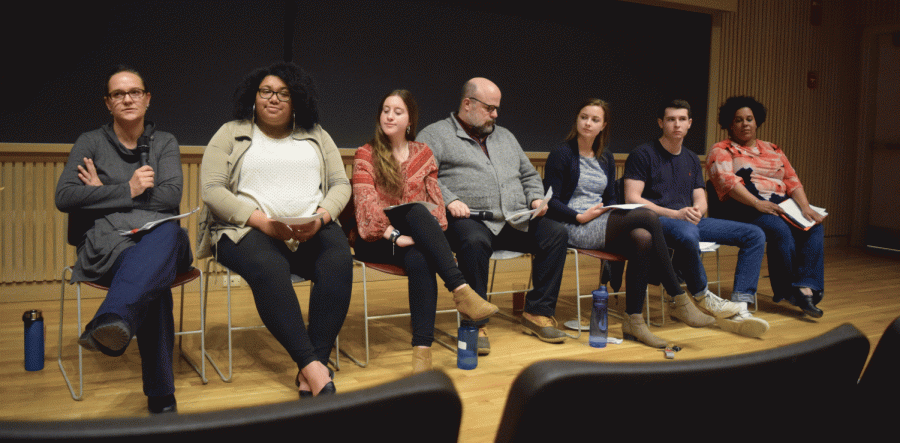Panel Discusses Results of Sexual Assault Campus Climate Survey
Community members participated in a panel discussion about the results of the Sexual Assault Campus Climate Survey facilitated by Dawn LaFrance.
On Thursday, March 28, Colgate faculty, staff and students chaired a panel to help educate the community on sexual violence prevention and response services available on campus. This panel was conducted on the heels of the 2019 Higher Education Data Sharing (HEDS) Consortium’s Sexual Assault Campus Climate Survey. Dawn LaFrance, Director of Counseling and Psychological Services and Haven, facilitated the discussion and said she hopes that these types of conversations will make Colgate a safer place to live and to learn.
The HEDS survey asked students about their perceptions of Colgate’s “climate for unwanted sexual contact and sexual assault,” as well as how Colgate “responds to sexual assaults, and whether or how often they have experienced sexual contact or sexual assault,” according to the HEDS website. The data from the survey helps inform the Colgate community on what it can and should be doing in terms of dealing with sexual violence and rape culture on campus.
“It helps us understand better where we’re living and learning,” LaFrance said.
Susan Woolley, Associate Professor of Educational Studies and Interim Director of Women’s Studies, said she was upset by several data points in this survey. For instance, she noted that 62 percent of the respondents said they were assaulted in their first year at Colgate. For Woolley, this begged the question: What sorts of prevention strategies could help first-year students? Woolley said the administration should consider weaving sexual violence education into orientation programs, required summer reading and or First-Year Seminars (FSEMs).
First-year Julia Sicklick commented on first-years’ risk in the “Red Zone,” a period of vulnerability for sexual assaults that typically lasts from first-year move-in day until Thanksgiving break. Sicklick said that a lack of information worsens this risk.
“I think all FSEMs or professors in general should bring their classes to Haven or have [Program Coordinator of Haven Tracia Banuelos] come speak at their classes. I think that would be really helpful because no one knows about Haven really,” Sicklick said.
Woolley additionally highlighted data that indicates that 92 percent of students who were sexually assaulted did not report the incident.
“The data simultaneously floored me but didn’t surprise me…I can understand why you don’t report…but I’m also very concerned,” Woolley said.
Woolley said that she believes this issue will only worsen due to the upcoming Title IX revisions. Title IX of the Education Amendments of 1972 prohibits discrimination on the basis of sex in any federally funded education program or activity.
Banuelos said that sexual assault prevention and education is imperative. She and other Haven members have and will continue to enter classroom conversations. Banuelos said she hopes to extend her outreach to other groups on campus as well.
“We have nothing to do in a science club, but there are survivors in a science club…Invite us,” Banuelos said.
First-year Nicole Weiss is someone who has benefited from services like Haven. Prior to her enrollment, Weiss was worried about coming to Colgate as she is a survivor of sexual assault. However, she has received an overwhelming amount of support from the Colgate community and has taken advantage of campus resources such as a survivor therapy group run by Haven.
“I made the right choice [by coming to Colgate],” Weiss said.
Like Banuelos, Mark Shiner, Colgate’s minister, is another on-campus confidential resource. Although the Church has played a controversial role in the sexual violence landscape, Shiner has dedicated himself to using his privilege and authority to respond to these types of issues in a just way.
“We’re being called to be better,” Shiner said.
Shiner hopes to create a safe and open culture within the Chapel. For example, the Office of Chaplains has half-glass doors, which sends a message to other spaces on campus: No one should be meeting behind closed doors.
Junior Eli Cousin, Bystander Intervention Intern, also acknowledges his position and duty as a white heterosexual male. He wants to use his privilege to normalize these conversations.
Moreover, he wants to use his gender to emphasize the fact that sexual violence is not a women’s issue.
“I’m looking out into the crowd and there’s really no male representation here sadly,” Cousin said. “The burden can’t solely be on women and survivors.”
Alicia Simmons, Associate Professor of Sociology, pointed to the data that demonstrate the lack of male participation in conversations regarding sexual violence. Over 80 percent of the respondents were women, and only 14.4 percent of Colgate students responded to the survey.
“What stories are we missing out on?” Simmons asked.
Senior Kate Bussey, member of both The Network and Sexual Violation Coalition, believes that many survivors’ stories are missing. She attributes their silence to the “intrinsically patriarchal environment on this campus.” She believes that athletes are spotlighted when injured, but when students go through a traumatic sexual event, they don’t receive necessary and deserved attention. Bussey calls for a greater emphasis on wellness.
Senior Ali Walsh found this conversation to be constructive and informative.
“I really enjoyed going to the panel and [I] specifically enjoyed hearing from the range of representatives and what their specialties were and what perspective they brought to this issue. I think including students was important and I was glad to hear my peers’ thoughts on this topic,” Walsh said. However, she wishes more people had come to this event.
Contact Lucy Feidelson at [email protected].
Correction: An earlier version of this article included an incorrect statistic about the number of students who completed the survey. In total, 14.4 percent of Colgate students took the survey.







